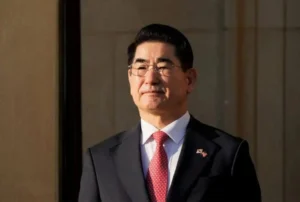South Korea’s political landscape has taken a dramatic turn as the main opposition Democratic Party announced its intention to impeach acting President Han Duck-soo. The decision comes amid escalating tensions over Han’s failure to appoint three justices to fill vacancies at the Constitutional Court.
Despite parliamentary approval of the nominees on Thursday, Han has yet to formalize their appointments, citing the lack of political consensus as a potential threat to constitutional order. The Democratic Party, which holds a parliamentary majority, has criticized Han for his inaction, accusing him of lacking the qualifications and resolve to uphold the Constitution. According to Democratic Party floor leader Park Chan-dae, Han’s inability to act decisively underscores his unsuitability for the role.
The controversy arises during a critical period for South Korea’s Constitutional Court, which is deliberating the impeachment of President Yoon Suk Yeol following his December 3 declaration of martial law. If Han is impeached, the finance minister would step in as acting president, further complicating the nation’s political turmoil.
Adding to the complexity, legal experts and lawmakers are divided on whether a simple majority or a two-thirds vote in parliament is required to impeach the acting president. Han, for his part, has emphasized the importance of reaching political agreement before making judicial appointments, warning that unilateral action could destabilize the constitutional framework.
The Constitutional Court is set to hold its first hearing on Friday to determine whether to uphold the impeachment of President Yoon or reinstate him. Under South Korean law, six of the court’s nine justices must agree to remove an impeached president. With only six justices currently seated, a unanimous decision is required, heightening the stakes.
Compounding the tension, President Yoon has yet to submit legal papers requested by the court, sparking criticism and calls for his arrest from opposition lawmakers. The political impasse has plunged South Korea into one of its most volatile periods in recent history, as the nation awaits pivotal decisions that could reshape its leadership and governance.


